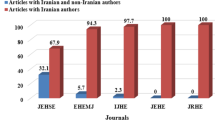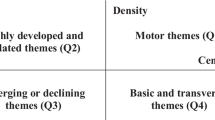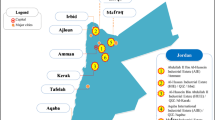Abstract
Background
Knowledge production in environmental health promotion is one of the most important goals at the national level and establishing environmental health research centers (EHRCs) is one of the main strategies that will lead to achieving this goal. In this study, we are going to present the results of knowledge production and research performance evaluation of EHRCs in Iran.
Methods
In this cross sectional study, a specific check list has been used to assess Knowledge production and utilization through annual evaluations undertaken by research centers in Iran. This article has the results of the 4-year evaluation (2011–2014).
Results
The total number of EHRCs under the supervision of universities of medical sciences (UMS) is 34. The number of faculty members at these centers is 291 and the total approved projects by research council of UMS during 2011–2014, were 538. The number of published article increased from 282 in 2011 to 709 in 2014. During this period, the number of citations to EHRCs’ articles was 4488 in Scopus database. The number of EHRCs’ articles which have been referred in text books were 39. The proportion of published articles per academic member in environmental health has been 1.8 per year.
Conclusion
Based on research performance evaluation, knowledge production and research is desirable in EHRCs, but research utilization to health environmental promotion is still inadequate and should be assessed by qualitative evaluation.



Similar content being viewed by others
Abbreviations
- MRC:
-
Medical Research Center
- MOHME:
-
Ministry of Health and Medical Education
- EHRC:
-
Environmental Health Research Center
- WHO:
-
World Health Organization
- UMSs:
-
Universities of Medical Sciences
- EH:
-
Environmental Health
- KTE:
-
Knowledge Translation & Exchange
References
Organization, W.H. Children’s environmental health: air pollution; 2014.
Frumkin H. Environmental health: from global to local. San Francisco: Wiley; 2016.
Chiriac SE, Ghidiu-Bîta IM. Globalization and sustainable development–the need for stronger integration and international cooperation in the environmental area. Annals of Spiru Haret University Economic Series. 2011;2(3):51–7.
health/en, h.w.i.t.e. Environmental health; 2012.
Panayotou T. Globalization and environment. Cambridge: Center for International Development at Harvard University; 2000.
Christmann P, Taylor G. Globalization and the environment: determinants of firm self-regulation in China. J Int Bus Stud. 2001;32(3):439–58.
Ichimura M. Urbanization, urban environment and land use: challenges and opportunities. In: Asia-Pacific Forum for Environment and Development, Expert Meeting 23 January 2003, Guilin, People’s Republic of China; 2003.
Yimer M. Urbanization and its consequence on the environment: case studies from sub-Saharan Africa. Scientific Journal of Crop Science. 2015;4(5):50–3.
McMichael AJ. The urban environment and health in a world of increasing globalization: issues for developing countries. Bull World Health Organ. 2000;78(9):1117–26.
Council, N.R. Research to protect, restore, and manage the environment. Washington: National Academies Press; 1993.
Cooke GD, et al. Restoration and management of lakes and reservoirs. Boca Raton: CRC press; 2016.
Andersson D, Fridell E, Halldorsson A. A total cost tool for internalising logistics and environmental externalities. In: 2013 Logistics Research; 2013.
Falahat K, Eftekhari M, Habibi E, Djalalinia Sh, Peykari N, Owlia P, et al. Trend of knowledge production of research centers in the field of medical sciences in Iran. Iranian J Public Health. 2013;42(Supple1):55–9.
Kiker GA, Bridges TS, Varghese A, Seager TP, Linkov I. Application of multicriteria decision analysis in environmental decision making. Integr Environ Assess Manag. 2005;1(2):95–108.
Youtie J, Kay L, Melkers J. Bibliographic coupling and network analysis to assess knowledge coalescence in a research center environment. Research Evaluation. 2013;22(3):145–56.
Ghanei M, Eftekhari MB. Health research system evaluation in IR of Iran. Arch Iran Med. 2012;15(7):394.
Falahat K, et al. Trend of knowledge production of research centers in the field of medical sciences in Iran. Iran J Public Health. 2013;42(1):55.
Prihodova L, Guerin S, Kernohan WG. Knowledge transfer and exchange frameworks in health and their applicability to palliative care: scoping review protocol. J Adv Nurs. 2015;71(7):1717–25.
Torres-Salinas D, Lopez-Cózar E, Jiménez-Contreras E. Ranking of departments and researchers within a university using two different databases: web of science versus Scopus. Scientometrics. 2009;80(3):761–74.
Daily BF, Huang S-c. Achieving sustainability through attention to human resource factors in environmental management. Int J Oper Prod Manag. 2001;21(12):1539–52.
Schulz A, Northridge ME. Social determinants of health: implications for environmental health promotion. Health Educ Behav. 2004;31(4):455–71.
Kreuter MW, de Rosa C, Howze EH, Baldwin GT. Understanding wicked problems: a key to advancing environmental health promotion. Health Educ Behav. 2004;31(4):441–54.
Acknowledgements
The authors would like to express their thanks to deputy for Research and Technology experts in Universities of Medical Sciences.
Author information
Authors and Affiliations
Contributions
AE supervised the study and he participated in all stages of study. MBE was the main investigator and she also has participated in all stages of the study (design of the study, collected the data, analyzing of data and manuscript preparation). KF was co- investigator which performed data collection and technical analysis. AM was advisor of the study and participated in the intellectual helping in different stages of the study. All authors read and approved the final manuscript.
Corresponding author
Ethics declarations
Competing interests
The authors declare that they have no competing interests.
Consent for publication
Not applicable.
Ethics approval and consent to participate
Not applicable.
Rights and permissions
About this article
Cite this article
Ebadifar, A., Mesdaghinia, A., Baradaran Eftekhari, M. et al. Assessment of Environmental Health Research Centers in Iran due to knowledge production and utilization. J Environ Health Sci Engineer 16, 35–40 (2018). https://doi.org/10.1007/s40201-018-0293-7
Received:
Accepted:
Published:
Issue Date:
DOI: https://doi.org/10.1007/s40201-018-0293-7




